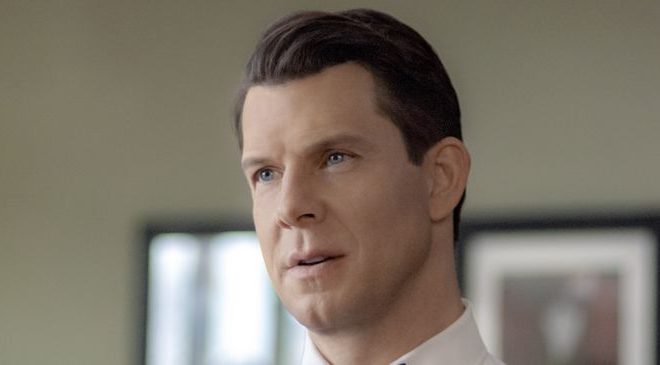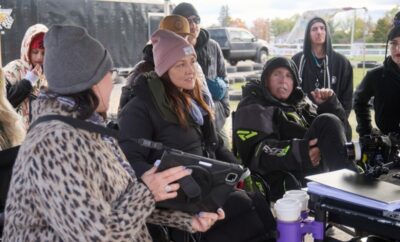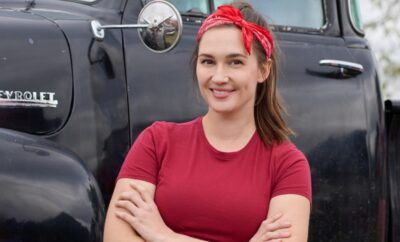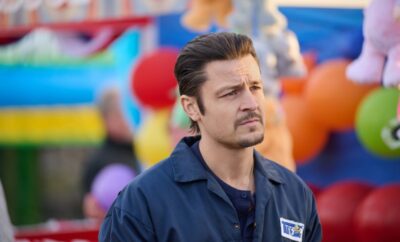
Interviews
Eric Mabius – Signed, Sealed, Delivered: To The Altar
By: Sammi Turano
Q) How would you describe this newest Signed, Sealed, Delivered installment?
A) I think that people who have tuned in over the course of the last five years are going to be really pleased because there are certainly themes that we’ve introduced and revisited. There’s some tying up of some storylines but also some deepening of others. I think the great thing about what Martha [Williamson] does in the writing is there are real-life events that she finds a way to intertwine into these characters’ lives. Sometimes we don’t find who we are completely until that right person unlocks those things in us and I think that we see that in Norman (Geoff Gustafson) and Rita (Crystal Lowe). There’s going to be something for everyone to attach themselves, project onto, in this. Barry Bostwick comes back as Rita’s father. Her mother, unfortunately, passed away but there’s people standing in in their stead. The fact that this is also a mirror for Oliver’s character in trying to come to terms with his feelings for Shane (Kristin Booth), but also being afraid of commitment because of his past mistakes, and what Norman and Rita are going through provides wonderful catharsis I think for him. They sort of ease into the idea and there’s also a wonderful bit of tradition and mystery about the O’Toole family’s history, shall we say, with weddings and proposals.
Q) How do you think Oliver has changed since the series began?
A) I think that what I have learned as Oliver, who has constructed this sort of this wonderful universe, the Dead Letter Office, was in charge in so many ways – or so he thought – and he had his band of Norman and Rita and they would go about their business and nothing pushed him off-balance or challenged him. When Shane was introduced it pushed him off-balance, but you realize he was living somewhat of a two-dimensional life and as his journey to becoming more three-dimensional and more able to get in touch with his feelings – Shane has opened these things up in him. I’ve become much less protective of who he is because I think each of us in our own way, have become much more confident in these characters. Our commitment to playing these characters has deepened over time and when you’re on to something that people respond to it gives you the freedom to go much more deeply into those things. The great thing about Martha is she actually goes about sitting down – it could just be a seemingly casual conversation she’ll have with us but she’s actually mining us for personal, real-life experience that she might find a way to weave into these characters. And she’s done that quite a few times, or changed it in one way or another, but there are real-life experiences in some of the most intense episodes that she’s found a way to weave into the characters’ lives so as a result, we become more committed as actors playing these characters and believing our characters. More of it is also the audience, I think, sensing that something is going on with many deeper levels. And it certainly isn’t your standard fare on the network and we really try to challenge an audience and I think – because there are so many different kinds of characters on the show that there’s something for everyone to attach themselves to or project onto even if it’s a teenager watching a character who’s like Carol Burnett, who’s in her ’80s, there might be something that sparks something familiar or something that reminds them of a grandparent or, you know, you never know with Martha’s writing – it sort of sets all these other things into motion that you don’t necessarily anticipate. You could teach a college class doing flow charts off of how she introduces things and how she ties them up and refers back to them in each of these installments. It’s brilliant, it really is, and I don’t use that term lightly.
Q) Was there anything you’ve added to him throughout the years?
A) I think I’ve added a certain playfulness to Oliver that Martha’s allowed to come to the forefront. As I’ve put a little more of my own playfulness into the character she finds a way to twist that. As she’s gotten to know us over time, the quirks of Geoff – what a great actor he is and he’s one of the funniest people I’ve ever worked with – and finding ways to work that into who Norman is, I think, is a real talent. And I think that, in fits and turns, there’s playfulness and a desire to be once in a while, even though it goes against Oliver’s own narrative, the one he has constructed and telling himself who he is on a day-to-day basis. Having Shane come into his life, she’s a catalyst for going in all these other directions, just learning how to be silly, learning how to – he has been married once before but in so many ways he wasn’t fully formed yet and was earlier on in his evolution, I think.
Q) What keeps challenging you about your portrayal?
A) That’s so easy and so hard at the same time. When she sits down and writes these movies, she doesn’t do it to fulfill exposition of a plot line. She does it to bring something entirely new to these characters. Not a whole lot is challenging because I just come to work to play. That’s the great thing about what she does. And Kevin Fair has directed most of these movies and we have such freedom to explore there, it’s probably the most rewarding job I’ve ever had because of that. I don’t have to struggle to find something new because it’s there on the page and what Martha does, I love coming to work to play with the other actors. To work with Gregory Harrison as your dad and Barry Bostwick as Crystal’s father and Carol Burnett as Geoff’s grandmother and on and on and on. What’s challenging is not being able to do it more than a few times a year! We all kind of Jones after a month or so of not shooting going, “Okay, we’re ready, let’s do another one.” It’s really a job that I love to go to every day and I never get sick of.
Q) What keeps you going back to this series of movies?
A) I think that give and take that we have with the audience. It was like that with “Ugly Betty.” Once in a while, a producer would come and read a fan letter – and this sounds over-the-top – but they came to set one day and read this letter from the daughter of this woman in her ’80s who had passed away and they had asked her what she is going to miss the most when she passes away and she said, “Not being able to watch more episodes of ‘Ugly Betty.’” I swear to God. And you couldn’t ask for a higher compliment than that. So, I feel that there’s a really amazing rapport with our audience and that in the 60thor 70thhour of work that week when we’re tired and we’re all away from our families and loved ones I think the fact that what we’re doing is landing, that people are deeply moved by what we’re doing, that also it’s a really funny show, it doesn’t take itself too seriously, that’s what so great – you’ve got the bitter and the sweet. It’s pretty amazing to go to work on a script by the woman who created “Touched by an Angel” or her first writing job was on “The Facts of Life” – those are shows that everyone’s seen, of a certain age. It’s just a joy that someone who can write great film is doing television and it’s pretty special.
Q) What is it about Shane that connects her and Oliver so deeply?
A) I find that, more often than not, in life the couples that last or people that are drawn towards one another don’t have as many similarities as they’d like to think. Obviously, the statement that “opposites attract” comes to bear here. There was a piece missing in the puzzle of who he is as a person. We’ve learned over the course of the show that Oliver has felt incomplete in some ways because the father that raised him was not his biological father so in some ways he felt rejected. So, he fashioned his stolid nature after a grandfather who was not a grandfather by blood but just decided that’s who he was going to be. But it wasn’t by blood until later on, of course. So, a real identity crisis and the evolution and lessons that Oliver can extract – he can decide now…it’s like he had to go through all that journey to decide to finally be his own man. To go on that journey and that his father who was not his biological father chose to stand by him – Gregory Harrison, for all intents and purposes, is his father and he wasn’t encumbered in a way that he was until that point. So, Shane coming into his life fit into that unpredictable fabric that he can go in any direction – he wasn’t forced to be this thing or that thing or toe the line or follow ceremony anymore. So, it opened up a whole series of different paths for him, I think, and Martha’s been really good about finding ways to explore that. There’s just so many more directions we have yet to go in. A lot of people think, “Oh, well, the inevitable might be Shane and Oliver getting married,” but that’s really a jumping off point for a whole new shift and what comes with that and how Oliver would change, just like when he found out he was given up by a father who ended up, he ended up inheriting his fortune. So, he had all this mobility to follow philanthropic interest while still hanging on to his job because he enjoyed it so much. And Shane continues to challenge him in each of these endeavors in new ways because there is not an apples-to-apples kind of transition in that she’s learned to become more responsible and trusting and he’s vice versa. But there’s a filling out that’s more realistic, I think. The changes happen slowly over time sometimes or quickly when we’re given the chance when we are introduced to someone new in our lives it creates this burst of change and that’s what’s so great.
Q) What is your favorite memory from filming this movie?
A) Being able to handle a thousand-pound cow, maybe she was more than that. This is why I love Kevin, the director. I said, “You know what, Kevin? We’re supposed to be preparing for the wedding. We’re supposed to be setting up the tables. You know what I’d like to do in this scene? I’d like to take that cow out of the stall and walk her out through the barn doors,” and he said, “Okay, why don’t you do it?” So, I did! It was fun. You don’t get to do this every day at work!
Q) Who are some new people we can expect to see in this movie?
A) I was focused on getting Keb’ Mo’ back and enjoying that and sitting for every take that he sang. And getting Barry Bostwick back. I was busy with my father. I was helping Norman get ready for his wedding.
Q) What is your favorite scene from the movie and why?
A) Honestly, it has to be the wedding. It was so much fun to shoot and I get really choked up at weddings. But also, having Keb’ Mo’ come back and sing as a main part of the wedding and having our toast together finally, all the chaos ensues and, of course, we have Ramon (Zak Santiago) back to officiate the wedding. It all dovetailed so nicely and the final toast that the POstables have really leaves so much promise for what lies ahead and what they’ve accomplished so far that you really feel like these are four people that have found one another and they’ve been able to fashion a family by choice and they’ve been through so much it’s sort of like a looking forward and a looking back and a really wonderful moment when we have our toast. And I think every time I went to make my toast I got choked up because we don’t know if we’re having more episodes or not, so it hit me in a pretty strong way.
Q) What do you think makes the series so appealing?
A) That circles back to there is something Martha Williamson manages to find a way to introduce characters…on a regular TV show, if they want to introduce a certain emotion to that episode they will introduce a new character and that person will literally embody that one emotion but Martha trusts the characters enough to feather those emotions into the people that already exist so the audience becomes more invested and I think that takes time and that takes a real deft hand to try and deliver that. That’s why it continues to be rewarding for me. I go and do network TV from time to time, but you are literally one color in a huge palette and that’s your function, like a small cog in a huge machine. But in this, and this is what I love about Hallmark, that we’re allowed to create this kind of programming, that’s sort of right on the head is the essence I think of what is so great about doing a show on Hallmark. That they trust that you don’t have to do that – Okay, we know exactly that is the bad guy or that is the mean person or that is the foil to the relationship or whatever that one thing is. These characters come in and they allow for sophisticated television that can be delivered to families because there’s just no other place to get that.
Q) How do you feel about getting instant live feedback via social media during the movies from POstables?
A) Probably one of the most fun parts of what we do because we sort of labor in a vacuum and we just have the crew members and one another as sounding boards, so we work and work and work, we’ve got to trust the director and trust the words on the page. We’ve got to trust Kevin to direct us. Getting real interaction, it’s always so neat and curious to see what lands with an audience or what they want to talk about. They’ll go back-and-forth about a thing that we haven’t even thought about but ends up being a source of real deliberation and that’s what’s so great. There are things to double back on and keep on investigating or discovering and it’s like we are peeling back these deeper layers of the onion. We’re really getting to the essence of who these characters are. Again, it’s hard to translate an emotion, a specific series of emotions into words, but the example of the toast at the end of the wedding at the end of this movie, there’s so much that we bring to that experience of playing the characters. We’re at the top of a mountain and we look back and we look forward and the audience is what keeps us going – their feedback, and if the show does well enough then we’ll probably come back. That’s generally how this works.
Q) What other projects are you working on?
A) I just finished a movie, definitely not a family movie, but it was so rewarding. I played he disgraced NBA ref Tim Donaghy who was indicted by the FBI for fixing the NBA games. It was a brilliant script and so much fun and a great cast. We shot that all over Atlantic City, North Jersey, Albany, Los Angeles, everywhere – it was a great indie movie and it’s kind of a nice counterpoint to playing Oliver. And I also have been working on developing another series of movies with another producer I’ve worked with before for Hallmark.
Q) You often take on dramatic roles. What is it about this genre that continues to draw you in?
A) I think it’s just what ends up happening in our lives. It’s a point of transition, there’s an obstacle to overcome and usually drama is created as a result of that. I’ve got two young boys; every single interaction is full of drama! And, again, that’s what’s so great about Signed, Sealed, Delivered, there’s some really, really funny moments and that’s what’s so great about what Martha does. Each movie, when we do the read-throughs, Geoff prides himself on being a tough guy, someone you can’t make laugh very easily but usually by the end of each read-through, Geoff stops reading and I realize what’s going on and he says, “Gosh darn it, Martha, you did it again,” and he’s sobbing uncontrollably. And usually everyone has their turn at that in most read-throughs. It’s the unexpected. You understand intellectually what’s happening, but when it comes to actually playing those moments there’s the unpredictability of the act of playing something that’s well-written, that you don’t overthink the thing and you trust what’s written on the page and the dramatic moments come out of that. You have A and B and all of a sudden, you have X and you have no idea how it happened, but it just does. That’s why I’m always surprised when I go to watch Signed, Sealed, Delivered, which I don’t really ever watch all the way through because I’m so critical of what I do, but I do know that I usually check in with a scene that I was curious what I ended up doing because I don’t really remember so much when I’m doing it, which is a great thing to be able to not muscle every single moment. It doesn’t happen that often in a career, to be able to come together with a writer and a director and actors where you feel safe enough to not predetermine moments and just really let it rip in some ways. It’s an exciting thing. Everyone, hopefully, can find that thing that they’re passionate about and this is one of those things that makes me really happy to do what I do, because I can really go to another place when we’re doing this. Sort of that in between place where we can lose ourselves in these characters and the audience, in watching, gets to as well.
Q) What are you watching on TV these days?
A) I like this Taylor Sheridan, he’s a great writer, and he wrote this new series called “Yellowstone” and I read the script and I was wondering how they were going to tackle it and I like what they’re doing so far. Kevin Costner is the lead and they really take on some important themes and I think they’re doing it in a pretty exciting way. It’s on Paramount TV.
Q) Anything else you want to tell your fans?
A) If they want the show to come back, tell everyone they know! We’d love to keep doing it.





You must be logged in to post a comment Login